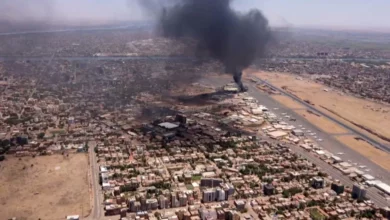Sudan’s President Omar al-Bashir pledged Tuesday to help build a secure, stable and brotherly state in the South if it votes for independence in a referendum less than two weeks away.
As the country prepared for the 9 January referendum, Secretary General of the Arab League Amr Moussa arrived in Khartoum Tuesday on a two-day visit for talks with Bashir and Southern leader Salva Kiir.
“We will not deny our Southern brothers their decision, and we will help them to build their state, because we want a secure and stable state…if there are troubles, these troubles will come to us,” Bashir said in a speech broadcast live on state television.
Speaking before thousands of supporters in Gezira state, Sudan’s breadbasket southeast of Khartoum, Bashir said he would be “the first to recognize the South” if it chooses secession in a free and fair vote on 9 January.
“The ball is in your court and the decision is yours. If you say unity, welcome. And if you say secession, also welcome, and welcome to a new brotherly state,” he said. “We are going to cooperate and integrate in all areas because what is between us is more than what is between any other countries.”
Speaking to reporters in Khartoum, Moussa said he saw no indication that North and South Sudan would return to war, with a referendum on independence for the South looming.
“I don’t see any indication that the parties have the willingness to go back to war,” Moussa added. “What is going on between them is far away from war. There is a political good will.”
Moussa is also expected to visit the southern capital Juba. “I will discuss post-referendum issues in Khartoum and Juba and how to save a good relationship between the North and the South,” he said. “The future of the relationship has an impact on the region.”
North and south Sudan fought a devastating 22-year civil war, in which some 2 million people died, that formally ended with the signing of a comprehensive peace agreement in 2005.
The January 9 referendum is the key plank of the 2005 peace deal and is widely expected to bring independence to the South.
Since July, Khartoum and Juba have been unsuccessfully discussing the key post-referendum sticking points, including future citizenship arrangements, the sharing out of natural resources–especially oil–security and compliance with international accords.
Some 3.5 million southerners are registered to vote in the plebiscite, according to referendum commission spokesman George Makuer Benjamin.
Bashir, who is wanted by the International Criminal Court for war crimes and genocide in Darfur, said earlier this month that the North would reinforce Sharia, or Islamic law, after the referendum which is widely expected to grant the South independence.
The interim Constitution enacted after the Comprehensive Peace Agreement of 2005 recognized the “multi-faith” character of the state.
Bashir’s remarks startled many Christians and even Muslims who do not wish to live under an Islamist state.




